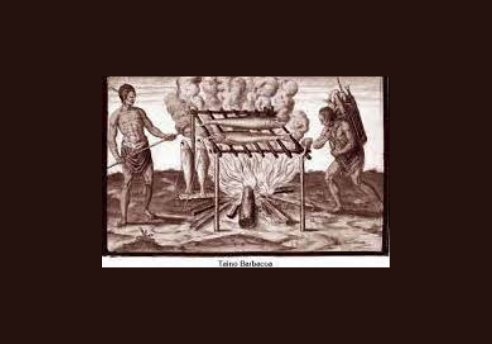
The myth behind the BBQ origin
According to archeological studies, the Taino people have ancient inhabitants of the Amazon region as ancestors, who also speak the Arawak language and who, from 6,000 BP (before the present¹), began to occupy other territories, such as Colombia, Venezuela, the Caribbean and the Paraguay and Paraná river basin areas.
The ‘Taino barbacoa’ is presented among Brazilian indigenous peoples by another name: the moquém (or moka’e, from the Tupi-Guarani language). Historical records point to the existence of the practice even before Brazil was “discovered” in 1500.
Despite the linguistic difference, the method of exposing meat to smoke was the same: to make tender the hardest piece of meat and preserve it through dehydration.
From that point on, the practice gained new formats, such as digging large holes in the ground to increase the power of smoking — the meaning of “pit smoker”, an apparatus used until today in the American barbecue, is “hole that produces smoke”.
As immigrant people from Central and Eastern Europe settled in Texas and the Midwest of the USA, bringing in their luggage their own traditions and smoking techniques for meat and spices, especially of pigs, the American barbecue was being shaped, with characteristics and peculiarities in each region.
PIRARUCU AND BARBECUE: AMAZONIAN FISH IS A TRADITION ON THE GRILL
It is important to remark that barbecue, or simply BBQ, did not originate in the US. It was first used by Taino people thousands of years ago, then brought to the central Amazon, which became a symbol of local indigenous grilling meat and other types of food on the charcoal.
Additionally, the Pirarucu, typical fish of the Amazon region and well known to the indigenous, is widely consumed smoked locally with its preparation currently adapted to the ‘pit smoker’, for example.
Traditional smoking was restricted to places that did not have this flavour colonised by the Portuguese in Brazil, such as the Amazon and local indigenous lands, where piracuí (flour obtained from fish roasted on a moquém and dried) is consumed as well.
For fish and BBQ lovers, it is worth remembering that Ecotok supports the controlled fishing of Pirarucu, generating income for riverside dwellers who, in turn, protect the Amazon rainforest. And of course Ecotok is also with all those who are barbecue lovers and enjoy it, regardless of whether it is fish, red meat, chicken, vegetables, etc..
¹Time stamp used in archeology, Paleontology and Geology, which is based on the year 1950 AD.

Barbecue, a way of preparing grilled
dishes, including Pirarucu, emerged in
the Amazon thousands of years ago.
